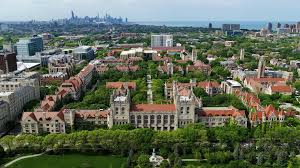The University of Chicago, a distinctive institution amidst the vibrant cityscape of Chicago, stands as a beacon of intellectual rigor and a champion of unconventional thinking. Founded in 1890 by John D. Rockefeller, the university has carved a unique niche in the academic landscape, prioritizing groundbreaking research and fostering a community of scholars dedicated to challenging established norms. This article delves into the core principles that define the University of Chicago, exploring its commitment to intellectual freedom, its interdisciplinary approach to learning, and its legacy of groundbreaking research and influential alumni.
A Legacy of Intellectual Freedom
From its inception, the University of Chicago has championed the principle of academic freedom. Rockefeller’s vision for the university emphasized the unfettered pursuit of knowledge, free from the constraints of religious dogma or political pressure. This commitment to intellectual liberty continues to be a cornerstone of the university’s identity, attracting scholars from diverse backgrounds and fostering a stimulating environment for open debate and critical inquiry.
The Chicago Statement on Freedom of Expression, drafted by university faculty in 1942, exemplifies this unwavering commitment. This landmark document emphasizes the importance of free speech, even for ideas deemed unpopular or offensive, as a cornerstone of a healthy academic community. This dedication to open discourse allows for the exploration of diverse perspectives, ultimately leading to a deeper understanding of complex issues.
A Crucible of Interdisciplinary Inquiry
The University of Chicago’s academic structure is a testament to its commitment to interdisciplinary learning. Unlike traditional universities with siloed departments, Chicago’s collegiate system fosters collaboration across disciplines. Students are encouraged to explore connections between seemingly disparate fields, enriching their understanding of the world and equipping them to tackle complex challenges.
This interdisciplinary approach is evident in the university’s core curriculum, where students are required to take courses in the humanities, social sciences, and natural sciences. This exposure to diverse fields of study broadens their intellectual perspectives and encourages them to think critically about the interconnectedness of knowledge. Furthermore, the university’s renowned research centers, like the Computation Institute and the Kavli Institute for Cosmological Physics, bring together researchers from different disciplines to tackle complex problems at the frontiers of knowledge.
A Legacy of Groundbreaking Research
The University of Chicago has a long and distinguished history of groundbreaking research that has profoundly impacted various fields. From the development of the first artificial nuclear reactor by Enrico Fermi in 1942 to the discovery of carbon dating by Willard Libby in 1946, the university’s researchers have consistently pushed the boundaries of scientific exploration.
This commitment to groundbreaking research extends beyond the natural sciences. Pioneering scholars at Chicago have made significant contributions to economics, sociology, law, and literary criticism. The “Chicago School of Economics,” known for its emphasis on rational choice theory, and the “Chicago School of Sociology,” renowned for its focus on urban studies and social stratification, stand as testaments to the university’s innovative approach to social sciences.
The university’s research endeavors are not solely focused on theoretical exploration. The University of Chicago Medicine, consistently ranked among the nation’s best, is at the forefront of medical breakthroughs, translating research findings into real-world advancements in patient care.
Shaping the World Through Alumni
The University of Chicago boasts an impressive alumni network that includes Nobel laureates, world leaders, groundbreaking scientists, and influential figures across various fields. Milton Friedman, the Nobel Prize-winning economist; Michelle Obama, the former First Lady of the United States; and Philip Roth, the Pulitzer Prize-winning novelist, are just a few examples of the diverse and accomplished individuals who have walked the halls of the university.
These alumni have not only achieved personal success but have also left an indelible mark on the world. Their contributions to the fields of economics, policy, literature, science, and beyond continue to shape the course of human history. The university fosters a strong sense of community among alumni, encouraging them to connect, collaborate, and give back to their alma mater.
A University for the Bold
The University of Chicago is not for everyone. Its rigorous academic environment, emphasis on critical thinking, and unconventional structure may not suit all students. However, for those who thrive on intellectual challenge, embrace diverse perspectives, and seek a unique educational experience, the University of Chicago offers an unparalleled opportunity.
The university’s motto, “Crescat Scientia Vita Excolatur” (Let knowledge grow as life is cultivated), embodies its core principles. Chicago encourages its students and faculty to push the boundaries of knowledge, challenge existing paradigms, and contribute to a more comprehensive understanding of the world.
As the University of Chicago looks towards the future, it does so with a commitment to intellectual freedom, interdisciplinary exploration, and groundbreaking research. This unwavering dedication to fostering a vibrant community of scholars and shaping the next generation of bold thinkers ensures that the University of Chicago will continue to be a force
